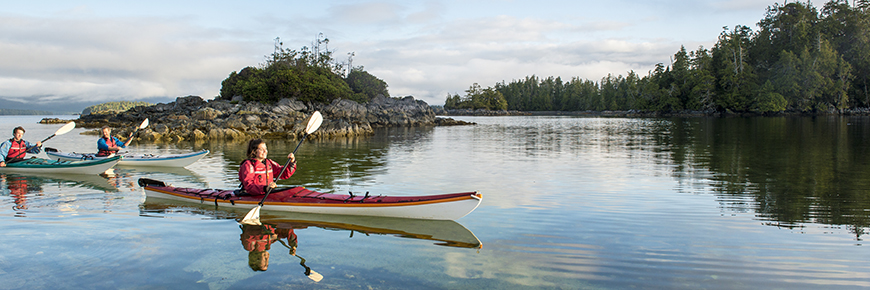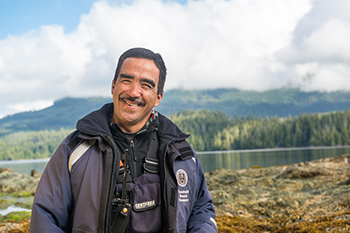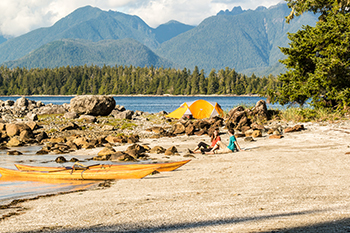
Camping in the Broken Group Islands
Pacific Rim National Park Reserve
Visit the Pacific Rim National Park Reserve COVID-19 page for updates on park facilities and servicesImportant Information
Facilities | Beachkeepers | High season | Regulations | National Park Entry Pass | Permits and fees | Other campers | Your impact on the environment
Camping facilities
All camping in this area of the national park reserve must be within designated camping areas located on Hand, Turret, Gibraltar, Willis, Dodd, Clarke and Gilbert Islands.
- Solar composting outhouses are provided at designated camping areas.
- Potable water is not available on the islands. Bring an adequate amount of freshwater with you. We recommend 4-6 litres per person, per day.
- There is no garbage pick-up. Store food and garbage securely while you are in the islands and pack it out at the end of your trip.

Beachkeepers
Beachkeepers patrolling the Broken Group Islands throughout the summer months maintain camping areas, provide information and interpretation services, check permits, and assist Parks Canada staff.
Camping in the high season
The peak visitation period for the Broken Group Islands is from July through August. Campers arriving in this period can expect to share camping areas with many other campers. To avoid the crowds of peak season try camping in May and June, or in September.
Camping regulations
- Camp in designated areas and sites only.
- Maximum stay in the Broken Group Islands is 14 days.
- Maximum stay at each camping area is 4 nights.
- Maximum group size is 12. Groups larger than 12 people must split into smaller groups and occupy designated campsites on different islands.
- Dogs are not permitted unless they are service pets.
- Park wardens enforce camping regulations: violators will be evicted.
National Park Entry Pass
All visitors to Pacific Rim NPR are required to have a valid National Park Entry Pass at all times while they are visiting the national park reserve. The exception is youth (17 years of age and younger) who have free entry into all of Parks Canada's places. This means that in addition to requiring a valid Broken Group Islands Backcountry Camping Permit, all visitors 18 years of age and older are also required to have a valid National Park Entry Pass.
The revenue from national park entry fees remains within the Coastal BC Field Unit to support the services and facilities that all visitors enjoy (including campsite facilities and amenities, visitor safety, signs, programs, etc.). The Broken Group Islands Backcountry Camping Permits do not include the national park entry fees, so you need to have a valid camping permit and a valid National Park Entry Pass at all times.

Backcountry camping permits
Anyone camping in the Broken Group Islands must have a backcountry camping permit. Backcountry camping permits are only available through the Parks Canada Reservation System. No spaces will be available for stand-by (first come first serve).
Reservations available as of 8 a.m. PST January 19, 2024
To reserve call 1-877-RESERVE or visit www.reservation.pc.gc.ca. Payment can be made by VISA, MasterCard, or American Express. Click here for current fees
When making a reservation, have the following ready:
- Preferred camping dates – first choice and alternate date
- Preferred camping locations – preferred and alternate islands
- Point of access location; where you will begin paddling from
- Number of campers in your group (maximum group size is 12)
- Email address to send confirmation and information to
- Means of payment: Visa, MasterCard or American Express
Cancellation policy
- Reservation fee: is non-refundable.
- Broken Group Islands backcountry camping permit:
- If you cancel a backcountry reservation at least 3 days prior to your scheduled day of arrival: you will receive a full refund less the original non-refundable reservation fee and the cancellation fee.
- If you cancel a reservation less than 3 days prior to your scheduled day of arrival, but before 2:00 p.m. on your scheduled day of arrival: you will receive a full refund less the original non-refundable reservation fee, the cancellation fee, plus the fees for the first night of backcountry camping.
Consider the needs of other campers
- Reduce noise, this is a wilderness setting. Refrain from using generators, stereos or air compressors.
- Leave space between you and your neighbour.
- Cook away from neighbouring tents.
- Neither private nor guided groups may reserve campsites.
Your impact on the environment
Pacific Rim National Park Reserve staff strive to manage activities within the national park reserve to protect the natural and cultural heritage of the area. Your appropriate, respectful behaviour will not only lead to a safe and rewarding experience but will also contribute to a healthy, functioning ecosystem. Parks Canada, First Nations and visitors' collective actions will ultimately ensure that future generations can appreciate and enjoy this special place. When you leave a camping area, ensure the area is in at least as pristine a condition as when you found it.
Tips:
- Use biodegradable soap.
- Use ropes (not nails) to hang tarps etc. Remove all ropes. Disassemble primitive furniture and structures before departing.
- Leave all vegetation as you find it. A rare lichen, the seaside centipede lichen, has been found in the Broken Group Islands. Breaking lower branches from trees could have a devastating impact on the species.
- Store food and garbage securely, either inside kayak hatches or in rodent and crow-proof containers. You are living with wildlife in the islands
- Pack out all garbage. There is no garbage pick-up in the Broken Group Islands.
- Use solar composting outhouses for bodily waste only. They are not compost piles for food scraps.
- Do not dig trenches around tents.
- Use a camp stove rather than a fire for cooking.
- Keep fires to a minimum, always below high tideline (never in the forest). Do not burn wood any thicker than your wrist and ensure the fire has burned out completely before you leave the area.
- Never abandon a fire: smouldering fires have ignited, burning the ancient rainforest in the islands.
- Assess the area for dangerous trees before setting up camp.
Campground hardening and rehabilitation
Parks Canada staff perform restoration work to protect exposed shell middens, bare roots and mineral soils on the campground islands. Please respect any fencing or signage you may encounter.
Visitor safety
- Read the BGI Paddler’s Preparation Guide
- Bare Campsite policy (PDF, 622 KB) in effect for your safety and the safety of others
- Review closures and important bulletins before planning your trip
- Bears, wolves and cougars live here. Learn more about safely sharing the park with Vancouver Island’s native predators
Related links
- Date modified :